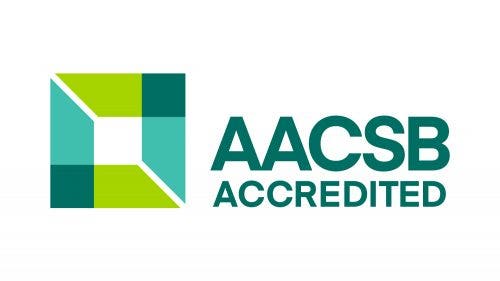What is Accreditation, and How is Our Healthcare MBA accredited?

If you have applied to educational programs or jobs, you might have seen a "degree from an accredited institution" listed as one of the prerequisites. Accreditation is an essential feature of any degree-granting program, including the popular healthcare-focused Master of Business Administration (HCMBA) track available at schools such as the George Washington University (GW).
Overview of Accreditation: What it is and why it matters
For a postsecondary school, being accredited means having demonstrated compliance with widely accepted educational standards. In the U.S., both the Department of Education and the nongovernmental Council for Higher Education Accreditation (CHEA) oversee and assist the various accrediting bodies that set these guidelines for graduate and undergraduate degree-granting programs.
However, neither the Department of Education nor CHEA actually accredits any individual institutions. That role is left to a select group of recognized regional and national accreditors, along with specialization accreditors for particular fields such as business and accounting.
Regional Accreditation
This is the most common and reputable form of accreditation. Depending on location, schools with regional accreditation are recognized by the following bodies:
- Middle States Commission of Higher Education (MSCHE)
- New England Association of Schools and Colleges Commission on Institutions of Higher Education
- Southern Association of Colleges and Schools Commission on Colleges
- Western Association of Schools and Colleges Senior College and University Commission
- Northwest Commission on Colleges and Universities
- Higher Learning Commission
Institutions with regional accreditation typically only accept transfer credits from similarly accredited schools. GW has regional accreditation from the MSCHE.
National Accreditation
Less common and prestigious than regional accreditation, national accreditation is largely reserved for vocational and trade schools, many of which are for-profit. Most not-for-profit institutions are also theoretically eligible, but instead opt for regional and specialty accreditation. The main organizations currently granting national accreditation, which are also overseen by the Department of Education and CHEA, are:
- Distance Education Accrediting Council
- Accrediting Council for Continuing Education and Training
- Accrediting Commission of Career Schools and Colleges
Specialized Accreditation
Professional schools, such as schools of business, may acquire additional accreditations specific to their respective fields. Such accreditation is separate from the preceding two types and not associated with the above bodies. In the case of MBA programs, the Association to Advance Collegiate Schools of Business (AACSB) is one of the most prominent organizations conferring such accreditation, offering it at international scale
With multiple main offices serving every region of the world, the AACSB is internationally renowned for the guidance and recognition it affords to business and accounting schools. It accredits these educational institutions via a rigorous, standardized and ongoing multi-year process.
The AACSB issued its first set of standards for accreditation in 1919 and it has been revising them ever since. As of 2018, the major revisions of the 2013 edition — with regular updates since their original publication — were the governing guidance for AACSB-accredited schools. AACSB touts its commitment to "engagement, innovation and impact" in its principles:
- Engagement: AACSB-accredited schools provide academic as well as professional engagement so business students are prepared for life after graduation.
- Innovation: The AACSB encourages continuous improvement and experimentation among its members and applicants to ensure a valuable experience for students.
- Impact: AACSB accreditation requires business schools to accurately assess how they make a difference for students and society through curriculum design and instruction.
With these principles in mind, every school with AACSB accreditation must complete the AACSB's Business School Questionnaire each year and also conduct a periodic five-year review of strategic process. These measures ensure consistency over the long term and help AACSB continually refine its standards.
Overall, the AACSB's guidance is wide-reaching, covering everything from student admissions to curricular content. Business and accounting schools with AACSB accreditation are participating in an international drive toward effective, ethical and socially responsible education. The GW School of Business has AACSB accreditation.
The Benefits of Accreditation
Accreditation is important because it signals to students that the schools they attend are credible and in compliance with industry standards. Accordingly, the degrees they earn from such institutions, whether an HCMBA or other professional, master's or bachelor's degree, will be recognized by employers and professional organizations.
Regional and specialized accreditation has several auxiliary benefits as well, including:
- Letting students transfer credits between accredited schools
- Making students in accredited programs eligible for financial aid
- Giving institutions clear benchmarks for improvement
- Enabling students to use their degrees from accredited schools to apply to additional programs and attain relevant certifications
For online degree programs, such as the HCMBA at GW, accreditation is especially important to distinguish worthwhile schools that offer instruction on par with traditional on-campus education from less reputable alternatives. The GW HCMBA is a 100 percent online track that's especially convenient for working professionals seeking maximum flexibility in how they complete the coursework. The same accreditations that govern the on-campus programs at GW — i.e., MSCHE and AACSB — apply to the online offerings as well.
More on Accreditation and the GW HCMBA Program
With both MSCHE and AACSB accreditation, GW is a reputable institution offering high-quality options for students at all stages of their academic and professional journeys. HCMBA candidates in particular can rest assured that the instruction and guidance they receive for the duration of the program conform to the latest recommendations for business education.
Additional information about the accreditation and distinctions of GW and the School of Business are available here. To learn more about applying to and completing the HCMBA track, visit the program overview page, where you can also answer a few simple questions to receive a free copy of our brochure with details on specific courses and requirements.